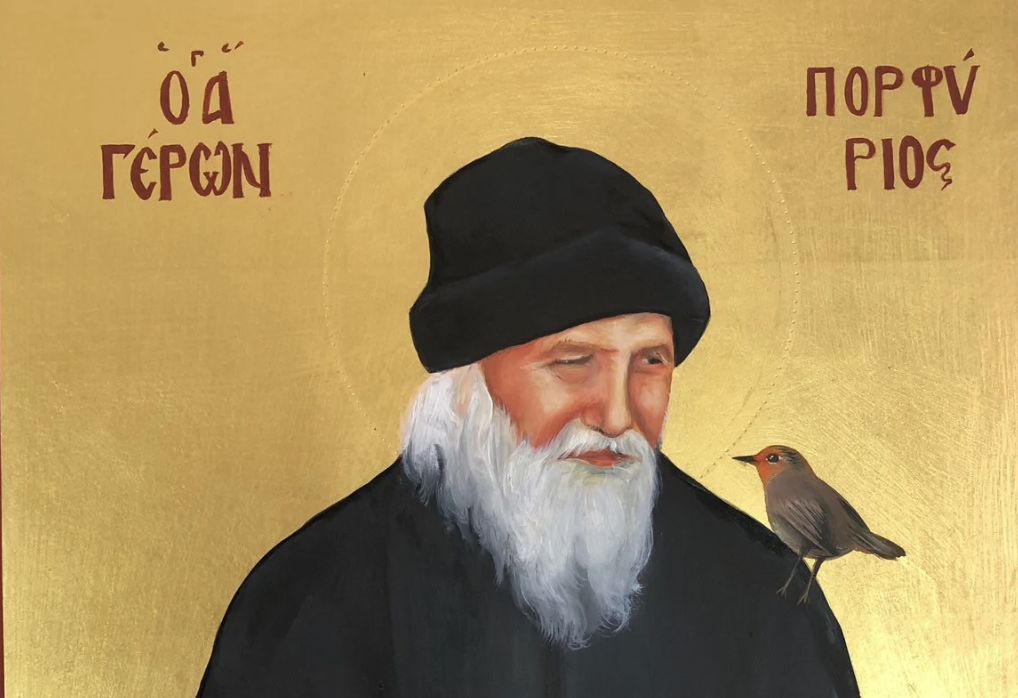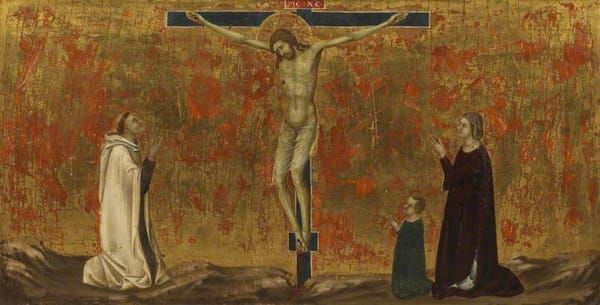Book Review: Spiritual Eldership, Confession and Charisms in Wounded by Love
It is as though the flame of divine eros burning brightly within Dimas made Porphyrios's own heart and soul ignite.

Porphyrios, Saint. Wounded by Love: The Life and the Wisdom of Saint Porphyrios. Edited by the Sisters of the Holy Convent of Chrysopigi and translated by Father John Raffan. Limni, Evia, Greece: Denis Harvey, 2018.
This fine presentation of the life and teachings of St. Porphyrios of Kavsokalyvia is an edited compilation from "an archive of notes and recordings" by two women "who knew [him] for a period of more than three decades. […] When, some ten years after the elder's death, these two women became nuns at the convent of Chrysopigi in western Crete, the archive was placed at the disposal of the convent" (ix). All of the words of the text body are drawn from Porphyrios himself, with occasional explanatory footnotes and scriptural citations in the margins. Although Elder Porphyrios was born with the name Evangelos, often called Angelos (2) or Vangelis (38), and had the monastic name Niketas (x) prior to receiving the name Porphyrios upon ordination to the priesthood (42), I will henceforth refer to him uniformly as Porphyrios for simplicity's sake.
The book is divided into two sections: the first a concise account of Porphyrios's life from parentage and childhood to his last recorded words before his death; and the second, about twice as long, a collection of his sayings grouped under topic headings. Biography and spiritual discourses flow into each other, with themes, events, and exhortations recurring across these dividers. Nor are Porphyrios's words confined strictly to the indicated topic, his associations flowing freely. In my assessment, the editors have successfully preserved the oral quality of the source material, conveying a sense of what it must have been like to sit in the elder's presence and hear him speak. As they indicate, their "prime concern was to present the words exactly as spoken, preserving their immediacy and authenticity" (ix). This light curation makes the text easily navigable while preserving candid disclosures of the kind rare in a standard hagiography.
It is one of those hagiographies of St. John the Hut-dweller (3) that inspires Porphyrios to became a monk at an exceptionally young age by stowing away on the ferry to Mt. Athos after two abortive attempts. (4-9) Although the elders who took him in at the skete of Kavsokalyvia have a reputation for strictness, he does not perceive it because of his deep love for them. (12) He has a number of encounters on Athos prior to being sent back to his family several years later for health reasons. (34-36) While his father is overjoyed to see Porphyrios, whom he does not initially recognize, once the latter discloses his identity, Porphyrios's mother does not initially accept his vocation, though later she grows in piety and becomes proud of her son. (37-38) Porphyrios is made a priest (42-43), chaplains a polyclinic in Athens (49-69), and helps found a women's monastery (7-81). Roughly speaking, the sequence proceeds from his early formation to his spiritual awakening and manifestation of charisms to his vocation as a confessor and spiritual father.
The pivotal event of Porphyrios's spiritual awakening was not any long apprenticeship but a brief, inwardly dramatic encounter with an old holy monk of Athos from Russian whom he calls "Old Dimas" (27-31). Dimas embodies the ideal of the hidden saint to which Porphyrios had always aspired, unknown to the world but beloved of God: "to live secretly" like those hermits who "died without anyone knowing them" (23). It was not by means of words or even direct interaction that Old Dimas mediated divine grace to Porphyrios. Merely being in Dimas's presence when the elder monk though he was unobserved, engaging in ecstatic heartfelt prayer, became the single most profound catalyst of Porphyrios's entire development. It is after this encounter that he attests to a "joy and exaltation" that never left him: "I lived among the stars, in infinity, in heaven. I wasn't like that previously" (30). It is as though the flame of divine eros burning brightly within Dimas made Porphyrios's own heart and soul ignite. "One thing is certain. Old Dimas transmitted to me the charisma of prayer and of clear sight [clairvoyance]" (29). From the standpoint of this experience, all his earlier training acquires the meaning of having prepared the ground for this initiation.
Porphyrios's gift also translated into the discernment of spirits in confession, which he heard "for more than fifty years." "While [a confessant] was talking away—and not only about personal matters—I would observe what his soul was like. From his whole attitude I understood his state and at the end I would say something to be of benefit to him" (53). It is as though time and space are contracted into the microcosm of the saint's heart, so that he encounters already the intimacy of heavenly time and space while yet in the body by the grace of God. Additional very practical applications are found when he recognizes his doctors have not set his broken bone properly (61-62) or finds the proper place to dig for a well (77-78). The gift seems to be a mixture of vision in the mind's eye and insight or intuition, which brings at once to mind the etymology of theoria (contemplation) where seeing is both perception and knowledge.
Much of his life story as well as his talks of guidance concern the cultivation of virtues and overcoming of vices. If there is a virtue most consistently modeled by St. Porphyrios, it is humility. This does not preclude him from speaking earnestly and forthrightly about his spiritual gifts or the at times miraculous experiences he has had. His humility is uninflected by any false modesty, the latter of which he equates with "an inferiority complex" (153). While this language suggests a naturalization of mental distress, Porphyrios preserves the monastic correlation of vices to non-metaphorical demons as well as "the revenge of the instincts" (153). The medical, moral, and metaphysical dimensions of virtues and vices are intimately entangled for Porphyrios so that what ails or comforts us cannot be reduced to any single factor. The realms of nature and grace cannot be neatly separated.
The way of approaching the prayer of the heart that Porphyrios recommends does not correspond precisely to the details of his own spiritual development, though there are clear resonances. In some ways his circumstances were particular to him and not susceptible to generalization. His training with two elders at Kavsokalyvia did not consist in precise instructions about the stages and methods of prayer. There is no indication that they met the criteria of the "spiritual guide [who] must be experienced in prayer of the heart." (124) They simply gave him the prayer rope and taught him the words—"Nothing more. No instruction, no explanation" (15). But it seems clear that their support in establishing a rhythm of life conducive to obedience and humility was a condition of his spiritual awakening if not its direct cause. Porphyrios emphasizes repeatedly that only with genuine humility and a transparency before God, through confiding all one's secret thoughts, deeds, and desires to one's confessor, can peace of heart be attained. (22-23)
The harshness with which he is disciplined by his elders is likely to prompt contemporary readers to ask whether Porphyrios's attitude to their authority is a healthy or a pathological one. The most difficult passages in this regard are those in which he is treated harshly for taking any initiative without the explicit permission of his elders, e.g. when his elder breaks a beautiful woodcarving he has made (21) or when he memorizes the Prologue of John's Gospel to recite by heart (25). He is sometimes given contradictory orders by Frs. Panteleimon and Ioannikios (13), catching him in a double bind, or despite his straightforwardness addressed as "you crooked fellow" (13). Despite all of this, Porphyrios maintains a pure perception of his elders, never ascribing faults to them but finding ways to think well of them and see them in the best light. He insists that his elders were never genuinely angry but only pretended to be so and that they gave him contradictory orders not due to inefficiency or caprice but as a way of testing him. He meets their discipline not with the thought that they should go easier on him but that "[they] should have been harsher to me, they should have punished me" (21).
This account raises the spectre of a certain tension between the type of transactions an elder instantiates, a playing of games or dramatic pedagogy, and the simplicity and innocence inculcated in novices. The complexity of the elder's role would seem to require a certain cunning or knack rather than the naïve, spontaneous act of love that Porphyrios seems to incarnate. This is a dynamic that some zealous Orthodox laity seek in their relation with their confessors yet which many priests regard as an inappropriate importation to the parish level of a strictness proper only to the monastic vocation. Porphyrios, rather than expecting obedience of those he counsels, finds instead that his own habit of obedience leads him to be indulgent towards those who ask things of him and to have a hard time saying no (56).
In line with this, when Porphyrios distils wisdom from his experiences for the benefit of inquirers, it is not a harsh or stern approach that he recommends. He contrasts "two paths that lead to God: the hard and debilitating path with fierce assaults against evil and the easy path with love." The former is attested to in the famous monastic exegesis of "The Kingdom of Heaven suffers violence and is taken by violent men" (Matthew 11:12), which alludes to sanctification through strenuous practice as exemplified by the Desert Fathers. While acknowledging the “many who chose the hard path and 'shed blood in order to receive Spirit' until they attained great virtue," Porphyrios exhorts his audience to follow "the shorter and safer route […] the path with love (136). Not merely an accommodation to ease the way of the laity but seemingly for most everyone, "the bloodless mode is the best mode of sanctification" (137).
Within that ethos, Porphyrios displays a shrewd understanding of the psyche when he insists that one ought not to inadvertently energize sins by paying attention to them. "Don't struggle directly with temptation, don't pray for it to go away […] Then you are acknowledging the strength of the temptation and it takes hold of you." Even though you are asking God to take it from you, "you are bringing it to mind and fomenting it even more." (137) . Using the analogy of a garden, Porphyrios compares the "power [placed by God] in man's soul" to the water with which one nourishes a garden: "it is up to him how he channels it." (135) Preoccupation with sins and passions, even to try to root them out, is counterproductive. Instead, one should water the flowers, i.e. through giving them attention that they may bear good fruit, and not the weeds, which "because they are not being watered, wither and die." (135)
The ultimate message of St. Porphyrios is that this work of theosis, whether undertaken in the world or in the renunciate monastic vocation, is imbued with a kenotic spirituality of world-redeeming love secured through self-abnegation. "No one," he says, "should wish to be saved alone. It is a mistake for someone to pray for himself, that he himself may be saved. We must love others and pray that no soul be lost, that all may enter into the Church" (89). So overflowing is this love for all of creation that it extends to "the grasses, the water, the rocks" (31) and the birds hymning praise (32). Porphyrios exemplifies the life in Christ and through him "in the stars, in infinity, in heaven with the angels, with the saints, on earth with people, with plants, with animals, with everyone and everything" (99).





